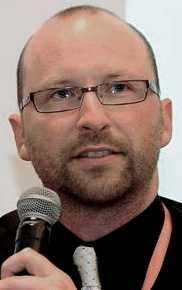

 Finally, Guyanese Internet users at all levels who are interested in internet governance issues and policy-making now have a local organization to address their interest. The Internet Society, a leading advocate for the open development, evolution, and use of the Internet for everyone, announced on October 10, 2017, at the official launch of the Internet Society Guyana Chapter that they were happy to finally have Guyana onboard. more
Finally, Guyanese Internet users at all levels who are interested in internet governance issues and policy-making now have a local organization to address their interest. The Internet Society, a leading advocate for the open development, evolution, and use of the Internet for everyone, announced on October 10, 2017, at the official launch of the Internet Society Guyana Chapter that they were happy to finally have Guyana onboard. more
Organizations behind two of the new geographic top-level domains, .amsterdam and .frl, have refused to provide public access to information about the registrants of domain names, otherwise known as Whois records. more
 On the 25th of September, the northern autonomous region of Iraq known as Kurdistan voted to become an independent country. This vote has led to a current standoff between the central Iraqi government and the Kurdish Regional Government (KRG), with the Kurds threatening to cut off internet service into Iraq in retaliation for any punitive measures inflicted by Baghdad on the KRG. The following analysis was written by Doug Madory of Oracle Dyn after ISIS took control of Mosul, Iraq in 2014. It describes how the internet of Iraq came to be dependent on international connections through telecoms based in Kurdistan. more
On the 25th of September, the northern autonomous region of Iraq known as Kurdistan voted to become an independent country. This vote has led to a current standoff between the central Iraqi government and the Kurdish Regional Government (KRG), with the Kurds threatening to cut off internet service into Iraq in retaliation for any punitive measures inflicted by Baghdad on the KRG. The following analysis was written by Doug Madory of Oracle Dyn after ISIS took control of Mosul, Iraq in 2014. It describes how the internet of Iraq came to be dependent on international connections through telecoms based in Kurdistan. more
The European Digital Rights (EDRi) and 56 other civil society organizations, sent an open letter today to EU decision-makers calling for the deletion of the Article 13 of the Copyright Directive proposal, pointing out that monitoring and filtering of internet content that it proposes breach citizens’ fundamental rights. more
 Before the American Registry for Internet Numbers' 40th Public Policy Meeting closed last week, members were reminded that the elections for two seats on its Board of Trustees was an opportunity for needed change. The opening of polls last Thursday marked the end of an era. The clue was the candidates. For the first time in ARIN’s history, at least one seat on its board would not be filled by an elected white male. more
Before the American Registry for Internet Numbers' 40th Public Policy Meeting closed last week, members were reminded that the elections for two seats on its Board of Trustees was an opportunity for needed change. The opening of polls last Thursday marked the end of an era. The clue was the candidates. For the first time in ARIN’s history, at least one seat on its board would not be filled by an elected white male. more
 Why does all of the discussion around potential options for WHOIS in the era of the EU's GDPR (General Data Protection Regulation) feel like déjà vu? Is it because issues around WHOIS never really go away, and become a hot topic every few years? Is it because no one is really happy with the current system? Privacy advocates would be delighted to do away with it altogether, while business and Intellectual Property professionals press for improvements to accuracy and availability, which I fully support. more
Why does all of the discussion around potential options for WHOIS in the era of the EU's GDPR (General Data Protection Regulation) feel like déjà vu? Is it because issues around WHOIS never really go away, and become a hot topic every few years? Is it because no one is really happy with the current system? Privacy advocates would be delighted to do away with it altogether, while business and Intellectual Property professionals press for improvements to accuracy and availability, which I fully support. more
 There's a deluge of hype around Bitcoin and blockchain technologies right now, and policymakers and regulators in the Caribbean are doing their best to wrap their heads around the advantages and disadvantages of this virtual currency. Similar questions are being contemplated in the ICTs for development (ICT4D) community, taking into account that electronic money (e-money) platforms such as Safaricom's M-PESA have essentially solved the financial inclusion quandary for millions of people in Kenya. more
There's a deluge of hype around Bitcoin and blockchain technologies right now, and policymakers and regulators in the Caribbean are doing their best to wrap their heads around the advantages and disadvantages of this virtual currency. Similar questions are being contemplated in the ICTs for development (ICT4D) community, taking into account that electronic money (e-money) platforms such as Safaricom's M-PESA have essentially solved the financial inclusion quandary for millions of people in Kenya. more
 Websites associated with the upcoming referendum in Catalonia are being blocked by ISPs in Spain. While several of the domain names used by advocates of the Catalan referendum have been seized by authorities others are being blocked by the ISPs in Spain. For those of us outside Spain the blocking has zero impact on us, so we can see the sites without any issue, but for users in Catalonia, ISPs are blocking access. more
Websites associated with the upcoming referendum in Catalonia are being blocked by ISPs in Spain. While several of the domain names used by advocates of the Catalan referendum have been seized by authorities others are being blocked by the ISPs in Spain. For those of us outside Spain the blocking has zero impact on us, so we can see the sites without any issue, but for users in Catalonia, ISPs are blocking access. more
 The Catalan government has written to the European Commission claiming that the Spanish government is in breach of EU law. In a letter from Jordi Puigneró Secretary of Telecommunications, Cybersecurity and the Digital Society at the Government of Catalonia addressed to Andrus Ansip, European Commissioner for Digital Economy and Society, the Catalan government calls out the moves by the Madrid government as censorship. more
The Catalan government has written to the European Commission claiming that the Spanish government is in breach of EU law. In a letter from Jordi Puigneró Secretary of Telecommunications, Cybersecurity and the Digital Society at the Government of Catalonia addressed to Andrus Ansip, European Commissioner for Digital Economy and Society, the Catalan government calls out the moves by the Madrid government as censorship. more
 This is the fundamental question that the Internet Society is posing through the report just launched today, our 2017 Global Internet Report: Paths to Our Digital Future. The report is a window into the diverse views and perspectives of a global community that cares deeply about how the Internet will evolve and impact humanity over the next 5-7 years. We couldn't know what we would find when we embarked on the journey to map what stakeholders believe could shape the future of the Internet... more
This is the fundamental question that the Internet Society is posing through the report just launched today, our 2017 Global Internet Report: Paths to Our Digital Future. The report is a window into the diverse views and perspectives of a global community that cares deeply about how the Internet will evolve and impact humanity over the next 5-7 years. We couldn't know what we would find when we embarked on the journey to map what stakeholders believe could shape the future of the Internet... more
 Cuban requests for Google services are being routed to GCC servers in Cuba, and all Google services that are available in Cuba are being cached -- not just YouTube. That will cut latency significantly, but Cuban data rates remain painfully slow. My guess is that Cubans will notice the improved performance in interactive applications, but maybe not perceive much of a change when watching a streaming video. more
Cuban requests for Google services are being routed to GCC servers in Cuba, and all Google services that are available in Cuba are being cached -- not just YouTube. That will cut latency significantly, but Cuban data rates remain painfully slow. My guess is that Cubans will notice the improved performance in interactive applications, but maybe not perceive much of a change when watching a streaming video. more
 When ICANN launched the new gTLD program five years ago, Amazon eagerly joined the process, applying for .AMAZON and its Chinese and Japanese translations, among many others. Our mission was -- and is -- simple and singular: We want to innovate on behalf of our customers through the DNS. ICANN evaluated our applications according to the community-developed Applicant Guidebook in 2012; they achieved perfect scores. more
When ICANN launched the new gTLD program five years ago, Amazon eagerly joined the process, applying for .AMAZON and its Chinese and Japanese translations, among many others. Our mission was -- and is -- simple and singular: We want to innovate on behalf of our customers through the DNS. ICANN evaluated our applications according to the community-developed Applicant Guidebook in 2012; they achieved perfect scores. more
 Google's Cuba project has been in the news lately. Mary Anastasia O'Grady wrote a Wall Street Journal article called "Google's Broken Promise to Cubans," criticising Google for being "wholly uninterested in the Cuban struggle for free speech" and assisting the Castro government. The article begins by taking a shot at President Obama who "raved" about an impending Google-Cuba deal "to start setting up more Wi-Fi access and broadband access on the island." more
Google's Cuba project has been in the news lately. Mary Anastasia O'Grady wrote a Wall Street Journal article called "Google's Broken Promise to Cubans," criticising Google for being "wholly uninterested in the Cuban struggle for free speech" and assisting the Castro government. The article begins by taking a shot at President Obama who "raved" about an impending Google-Cuba deal "to start setting up more Wi-Fi access and broadband access on the island." more
A leaked document by Statewatch reveals the current EU Presidency (Estonia) has been pushing the other Member States to strengthen indiscriminate internet surveillance and to follow in the footsteps of China regarding online censorship. more
 From the Internet's earliest days, the tension between a global communication network and local geography-based laws has been obvious. One scenario is that every jurisdiction's local laws apply to the Internet globally, meaning that the country (or sub-national regulator) with the most restrictive law for any content category sets the global standard for that content. If this scenario comes to pass, the Internet will only contain content that is legal in every jurisdiction in the world... more
From the Internet's earliest days, the tension between a global communication network and local geography-based laws has been obvious. One scenario is that every jurisdiction's local laws apply to the Internet globally, meaning that the country (or sub-national regulator) with the most restrictive law for any content category sets the global standard for that content. If this scenario comes to pass, the Internet will only contain content that is legal in every jurisdiction in the world... more